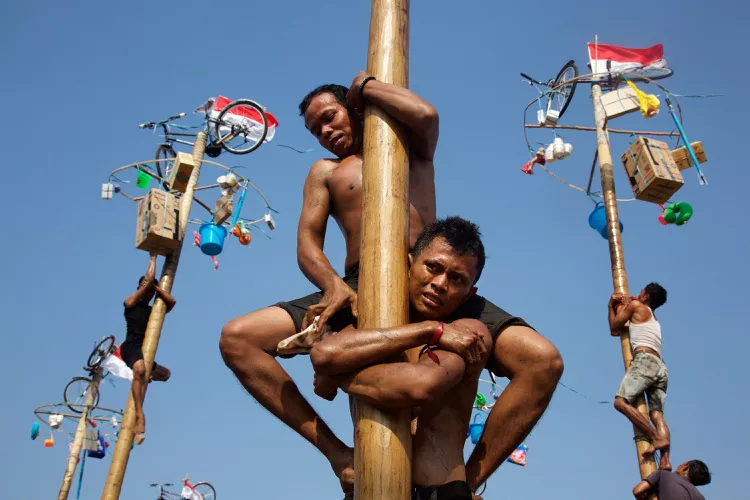1. Summary of Indonesian Independence Day
Indonesian Independence Day, or Hari Merdeka, is celebrated on August 17. This article explores the history, celebrations, and travel considerations around this significant holiday.
2. History of Hari Merdeka
Indonesian Independence Day, known locally as Hari Merdeka, is observed annually on August 17 to commemorate the declaration of independence from Dutch colonization in 1945.
Through a combination of diplomacy and revolutionary efforts, Indonesia achieved independence in December 1949. Interestingly, it wasn’t until 2005 that the Dutch officially recognized August 17, 1945, as Indonesia’s Independence Day.
Hari Merdeka in Indonesia
Hari Merdeka means “Independence Day” in Bahasa Indonesia and Bahasa Malaysia, a term applicable to both nations’ independence celebrations. However, it is crucial to distinguish it from Malaysia’s Hari Merdeka, celebrated on August 31, as Indonesia’s Independence Day is a separate event occurring on August 17.
Celebrating Indonesian Independence Day
Celebrations for Indonesian Independence Day occur nationwide, from bustling Jakarta to the smallest villages across the diverse archipelago of over 16,000 islands.
Vibrant parades, formal military processions, and numerous patriotic ceremonies are prevalent throughout the country. Schools actively engage in marching practice weeks in advance to prepare for the military-like processions that fill the main streets. Shopping malls host special seasonal sales and celebrations, and markets experience heightened activity.
The President of Indonesia addresses the nation on August 16, followed by an impressive flag hoisting ceremony at the National Palace that entails formal proceedings and military displays.
As the official ceremonies conclude, local festivities kick off. Villages and neighborhoods organize small stages with outdoor music, games, races, and eating contests, often featuring krupuk, the popular shrimp cracker found throughout Indonesia. A festive spirit engulfs the atmosphere, culminating in the energetic activity of panjat pinang, a traditional game embodying teamwork and skill.
What to Expect While Traveling
During Indonesian Independence Day, transportation can significantly slow down as many roads are closed, leading to traffic rerouting and congestion. Bus services may experience staffing shortages as drivers take holidays. Consequently, plane tickets may increase in price. Therefore, planning ahead by finding a comfortable spot to relax and partake in festivities on August 17 is advisable.
The Indonesian Proclamation of Independence
The Indonesian Proclamation of Independence was proclaimed in Jakarta on the morning of August 17, 1945, at the private residence of Sukarno Sosrodihardjo, who later became the nation’s first president. This moment occurred shortly after Japan announced its surrender to the Allies just two days prior.
Unlike the lengthy American Declaration of Independence, which spans over 1,000 words and includes 56 signatures, the brief Indonesian proclamation comprises just 45 words (in English), hastily prepared the night before and showcasing only two signatures—those of Sukarno and Mohammad Hatta, the new vice president.
This significant proclamation was clandestinely broadcast across the archipelago, with an English version disseminated internationally.
The proclamation’s text is succinct and impactful:
We the people of Indonesia hereby declare the independence of Indonesia. Matters which concern the transfer of power and other things will be executed by careful means and in the shortest possible time.
Djakarta, 17 August 1945 in the name of the people of Indonesia.
Panjat Pinang Games
A highlight of Indonesian Independence Day is the exciting panjat pinang, a tradition with colonial roots. This lively game involves heavily greased poles typically made from stripped nut trees, set up in village squares with various prizes placed at the top, just out of reach.
Contestants, often in teams, engage in a chaotic scramble up the pole to claim the prize. The initially humorous competition often transforms into a powerful exhibition of teamwork as participants confront the challenge of scaling the pole.
Exciting prize offerings in villages may include everyday household items like brooms and baskets, while more publicized events incentivize participation with vouchers for new TVs and cars.
While generally festive, panjat pinang is considered controversial by some due to its origins, which allowed Dutch colonists to enjoy moments of leisure at the locals’ expense. Injuries are not uncommon during these competitions, as poles are sometimes placed in muddy or watery ground for a safer—albeit messier—landing for contestants who fall from high up.
Advocates of panjat pinang argue that it promotes teamwork and selflessness among young male participants.
Traveling in Indonesia
Traveling in Indonesia, especially during Indonesian Independence Day, can be an extraordinary experience. As the fourth most populous nation and the largest island country, Indonesia presents countless travel opportunities. Explorers could spend years visiting Indonesia and still uncover new wonders!
While many international visitors typically head directly to Bali, numerous other fascinating destinations await discovery in the archipelago.
From Sumatra in the west to Papua in the east, where many uncontacted tribes are believed to hide in the forest, Indonesia invites all adventurers to explore its diverse landscapes and cultures.





